 |
| DISCOGRAPHY PART 2 |  |
|
| biography I discography 1 2 3 4 |
| abbreviations of instruments |
| acc = accordion as = alto sax b = bass bar-s = baritone sax bgo = bongo bs, bsx = bass sax bjo = banjo c = cello cl = clarinet cga = conga clav = claviola = hca |
co = cornet dr = drums el-b = electric bass engl-h = english-horn fl = flute fl-h = flugel-horn fr-h = french-horn g = guitar h = horn hca = harmonica keyb = keyboard |
ob = oboe org = organ p = piano perc = percussion ss = soprano sax perc = percussion ss = soprano sax tamb = tambourine timb = timbales tb = trombone tp = trumpet |
ts = tenor sax tu = tuba v = violin vib = vibraphone voc = vocals ww = woodwind arr. = arranger cond. = conductor dir. = director prod. = producer |
appears on:
| great post-war blues | 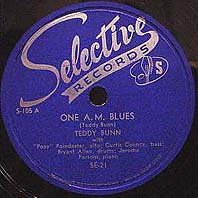 |
One A. M. Blues / Teddy Bunn recorded: 1949 in Los Angeles issued: 78 RPM, SELECTIVE RECORDS S-105 ; Side A also on Still Crazin´ More Ugly Guitar 1945-1955 FREEZONE 13006 TEDDY BUNN (g, voc); PONY POINDEXTER (as); JEROME PARSON (p); CURTIS COUNCE (b); BRYAN ALLEN (dr)
Jackson´s Nook / Teddy Bunn recorded: 1949 in Los Angeles issued: 78 RPM, SELECTIVE RECORDS S-114 Side A also on Very Best Of Teddy Bunn 1937-40 ; both tracks also on Still Crazin´ More Ugly Guitar 1945-1955 FREEZONE 13006 Side A 1. Jackson´s Nook Side B 1. I' ve Come A Long Ways Baby |
||
| Review: At the time that guitarist Wes Montgomery recorded 'Finger Pickin', he was an unknown guitarist from Indianapolis who, a decade earlier, had toured a bit with Lionel Hampton. By the final session on this two-LP set, he was on the verge of stardom. The innovative guitarist (who extended the style of Charlie Christian about as far as it could go) is in consistently superior form on these former rarities. Montgomery is heard with his brothers (vibraphonist/pianist Buddy and electric bassist Monk) in a variety of settings. Such sidemen as a 17 year old Freddie Hubbard (the trumpeter's recording debut), tenor-saxophonist Harold Land and altoist Pony Poindexter are also heard from on this straight-ahead set which has a generous supply of Wes Montgomery's originals (along with a few jammed standards). There is plenty of classic music here but this twofer will be difficult to find. | 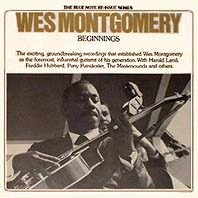 |
Beginnings / Wes Montgomery recorded: Dec. 30, 1957 in Indianapolis/IN (#2,3) ; Apr. 18 (#4-8), Apr. 22 (#13,14), 1958 in LA ; Oct. 1, 1959 (#9-12) in LA issued: WORLD PACIFIC JAZZ re-issued: 1975 BLUE NOTE BN LA 531-H2 WES MONTGOMERY (g); FREDDIE HUBBARD (tp #2,3); WAYMON ATKINSON, ALONZO JOHNSON (ts #2,3); HAROLD LAND (ts #4-8); PONY POINDEXTER (as #9-12); BUDDY MONT- GOMERY (p #2-12; vib #13,14); JOE BRADLEY (p #1-3); RICHIE CRABTREE (p #13,14); MONK MONTGOMERY (b); PAUL PARKER (dr #1-3); TONY BAZLEY (dr #4-8); LOUIS HAYES (dr #9-12); BENNY BARTH (dr #13,14)
|
||
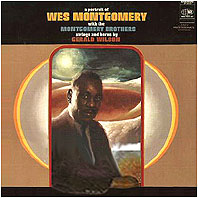 |
A Portrait Of Wes Montgomery recorded: 1957 - 1959 issues: PACIFIC JAZZ RECORDS ST 20137 ; LP LIBERTY LBS 83 178 ; LIBERTY ST 20137 (Germany) #A1 also on A Good Git-Together - Jon Hendricks WORLD PACIFIC WP 1283 #A3, #B1,2,4,5 also on Montgomeryland - W. Montgomery PACIFIC JAZZ PJ-5 #A3, Side B also on Far Wes - Wes Montgomery PACIFIC JAZZ 94475 #A2-4, #B1,2,4,5 also on Beginnings - Wes Montgomery BLUE NOTE A 531 #B3 also on The Montgomery Brothers PACIFIC JAZZ PJ 17 WES MONTGOMERY (g); FREDDIE HUBBARD (tp #A4); NAT ADDERLEY (cor #A1); WAYMON ATKINSON, ALONZO JOHNSON (ts #A4), HAROLD LAND (ts #A3,#B1,2,3); PONY POINDEXTER (as #B4,5); CANNONBALL ADDERLEY (as #A1), BUDDY MONTGOMERY (p); JON HENDRICKS (voc #A1); JOE BRADLEY (p #A2,4), MONK MONTGOMERY (el-b); PAUL PARKER (dr #A2,4), LOUIS HAYES (dr#B5), TONY BAZLEY (dr #A3,#B1,2,3); strings and horns by GERALD WILSON
|
|||
| Wes, Buddy And Monk Montgomery / The Montgomery Brothers recorded: April 18, 1958 (#1-7), October 1, 1959 (#8-11) in Los Angeles issues: PACIFIC JAZZ PJ 17 ; #1-3 also on Far Wes ; #4-11 also on Montgomeryland PACIFIC JAZZ PJ 5 HAROLD LAND (ts #1-7); PONY POINDEXTER (as #8-11); BUDDY MONTGOMERY (p); WES MONTGOMERY (g); MONK MONTGOMERY (b); TONY BAZLEY (dr #1-7); LOUIS HAYES (dr #8-11) 1. Hymn For Carl 2. Montgomeryland Funk [Montgomery Funk] 3. Stompin' At The Savoy 4. Far Wes 5. Leila 6. Old Folks 7. Wes' Tune 8. Monk's Shop 9. Summertime 10. Falling In Love With Love 11. Renie |
||
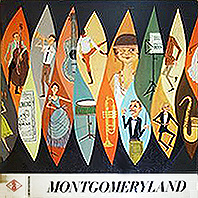 Australian issue (sides A & B are exchanged) |
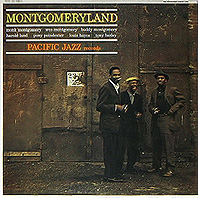 PACIFIC JAZZ PJ 5 |
Montgomeryland / Wes Montgomery recorded: April 18, 1958 (#1-4), October 1, 1959 (#5-8) in Los Angeles issues: July 1960 LP PACIFIC JAZZ PJ 5 (stereo) ; LP WORLD RECORD Intern. (Australia) ; KING RECORD (Japan) ; 1978 PACIFIC JAZZ RECORDS GXF 3109 (Japan) WES MONTGOMERY (g); HAROLD LAND (ts Side A); PONY POINDEXTER (as Side B); BUDDY MONTGOMERY (p); MONK MONTGOMERY (b); TONY BAZLEY (dr Side A); LOUIS HAYES (dr Side B) Side A 1. Far Wes 2. Leila 3. Old Folks 4. Wes' Tune Side B 1. Monk's Shop 2. Summertime 3. Falling In Love With Love 4. Renie |
| Review: This historical CD contains some of guitarist Wes Montgomery's first recordings; in fact only three small-group songs predate these performances. The then-obscure guitarist is heard in two different quintets, both of which include his brothers Buddy (on piano) and Monk (playing electric bass). The earlier set has Harold Land's tenor as a lead voice while altoist Pony Poindexter takes his place on the later date, Wes's sound was already quite recognizable and he contributes six originals which alternate with Harold Land's 'Hymn For Carl' and four standards. | 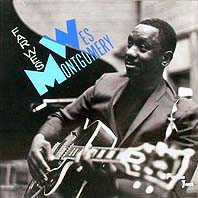 |
Far Wes / Wes Montgomery recorded: April 18, 1958 (#1-7), October 1, 1959 (#8-11) issues: 1990 CD PACIFIC JAZZ B2-94475 ; 1990 CS PACIFIC JAZZ B4-94475 ; CD PACIFIC JAZZ 94475 ; JHS 5162041 ; June 26, 1995 CD PACIFIC 5835173 WES MONTGOMERY (g); HAROLD LAND (ts #1-7); PONY POINDEXTER (as #8-11); BUDDY MONTGOMERY (p); MONK MONTGOMERY (b, el b); TONY BAZLEY (dr #1-7); LOUIS HAYES (dr #8-11); RICHARD BOCK, MICHAEL CUSCUNA (prod); DON DE MICHAEL (liner notes)
|
||
| Liner Notes: |
| When Wes Montgomery came out of Indianapolis in 1959 to see what the rest of the world looked like, he upset a lot of people. Like critics. They vied to see who could heap the highest praise on the head of the quiet, unpretentious man who happened to play the living bejabbers out of a guitar. “A giant!” one declared. “Like being hit by a thunderbolt", another exclaimed. “Even greater than I expected !” a third shouted, swooning. Montgomery fever soon spread through the jazz community at large, and the fans outdid the critics. Thousands declared that Wes was the greatest of all guitarists, to the implied detriment of such worthies as Kenny Burrell, Jim Hall, Jimmy Raney, Tal Farlow, Barney Kessel and, one supposes, Andres Segovia and Hank Garland. But Jazz fans, and critics, are like that, always looking for kings, the “best”, whatever that means. Musicians know better, and if there is anything they detest it’s a comparison of one man’s work to another’s. Music is not a contest. There are many flowers, of many hues and shapes, in the garden, and who can say a rose is more beautiful than a lily? There’s no need to choose. Enjoy them all. And it was musicians, not fans, not critics, who spread the word about Wes Montgomery long before he got up the gumption to leave his hometown. (Oh, he went out for awhile with Lionel Hampton’s screamin’ meanies in the early ‘50s, but that doesn’t count.) Wes had reason to stay in Indianapolis, not the most attractive or stimulating place one could name. He was getting on, 34 is a bit late in life for a jazz musician to try to make it on the national scene. Besides, he was good and married, with a flock of kids to feed and clothe. He had a day gig and a playing gig, which is about the only secure way a musician can support his family in places like Indianapolis. (It’s a tough, grinding life, one in which sleep takes on paramount importance, four hours here, two hours there, catnap on intermissions, wake up not sure where you are or which gig is up. It takes its toll. Wes Montgomery might not have died at 43 of a heart attack if he hadn’t had to work night and day all those years.) Another reason to stay home: it was comfortable musically. Like most jazz musicians, his close friends were the men he played with, some going all the way back to 1943 when Wes first ventured onto a bandstand to play the Charlie Christian solos he’d memorized from records. It’s hard to break the ties that bind like-minded and seemingly equally capable musicians. But Wes had reason to try his luck, too. Besides a large talent, he had two brothers, Monk and Buddy, who had gained a national reputation with their group, the Mastersounds, created in the likeness of the popular Modern Jazz Quartet. Monk and Buddy didn’t forget their brother. They raved to critics and record producers about him. They intended to form another group called the Montgomery Brothers and wanted Wes with them. Bookings were assured. Record companies were interested. Things looked awfully good, and Wes made up his mind to give it a whirl.The first recordings under his own name turned thousands of guitar players all the way ‘round. Octaves, octaves, octaves. Never before had a jazz guitarist used octaves as much, or so well, as Wes. In his early work, much of it heard in this album, he employed octaves judiciously, thickening his lines with them, alternating them with chorded and single-note passages, never stepping outside the bounds of good musical taste. The excesses came later, when the big-money boys turned Wes into a highly marketable commodity. In an interview with Ralph Gleason done a couple years after Wes had left Indianapolis, he recalled that “playing octaves was just a coincidence. And it’s still such a challenge... I used to have headaches everytime I played octaves, because it was extra strain, but the minute I’d quit I’d be all right. I don’t know why, but it was my way, and my way just backfired on me. | But now I don’t have headaches when I play octaves. I’m just showing you how a strain can capture a cat and almost choke him, but after a while it starts to ease up because you get used to it.”Wes was self-taught (as is every jazz musician, no matter how much he studies formally) and never felt comfortable using a guitar pick. He preferred his right thumb instead.“That’s one of my downfalls, too,” he told Gleason. “In order to get a certain amount of speed you should use a pick, I think. A lot of cats say you don’t have to play fast, but being able to play fast can make you phrase better. But I just didn’t like the sound. I tried it for about two months. Didn’t use the thumb at all. But after two months I still couldn’t use the pick, so I said I’d go ahead and use the thumb. But then I couldn’t use the thumb either, so I asked myself which are you going to use? I liked the tone better with the thumb, but the technique better with the pick, but I couldn’t have them both.”That he chose tone is obvious, for his dark, mellow sound is one of the most fetching aspects of his work. But tone, technique and musical devices are mere means. It is the end, the music - its shape, the ideas underlying it, the response it evokes - that matters. Wes Montgomery was a master of his art. His improvisations, especially in the early days, were com- positions in miniature. Each note sounds as if Wes tore it from the instrument, buffed it a bit and hung it carefully in just the right spot on his ever-moving musical line. Wes Montgomery was a man who knew what he was about.The performances with tenor saxophonist Harold Land were recorded in April 1958. The tenor-guitar voicing is strikingly similar to that of the Stan Getz Quintet of 1951?52, the group with Jimmy Raney, whom Wes once listed among his favorite guitarists. (One can hear occasional snatches of Raney and Tal Farlow, another Montgomery favorite, in some of Wes’ playing on this date.) Even Wes’ originals have something of the flavor of compositions the Getz five favored.The similarity ends there, though. Land and the Montgomerys were their own men and held no truck with imitation. Land, a pro of the first water who never has got the acclaim he deserves, is in fine form, never at a loss for ideas, never hesitant or obscure, always to the point and cogent. Buddy shines on piano. He sometimes indulges in Tatumesque flights, but mostly he snarls in the best Bud Powell manner. Though Wes was more or less a sideman on the date, as he was on the other sessions represented in this album, he clearly is the outstanding soloist. 'Old Folks' is astonishing, a summation of his approach to his instrument and to music. He displays great respect for Carson Robinson’s melody, stating it fairly straight in the opening chorus and embuing it with that deep, dark tone. Then after Land and Buggy have had their ways, Wes builds a flowing, sculptured improvisation that is almost conversational, like a man pleading, crying for love. It is among his finest recorded work. Something of the Getz-Raney sound carries over to the session with altoist Pony Poindexter, made a year and a half later. Though the performances were not quite up to the extremely high level of the Land tracks, Wes seems to have been in a warm, mellow mood. For example, in his utterly relaxed 'Falling In Love With Love' solo he evokes a feeling - just a whisper, really - of one of his early favorites, Django Reinhardt, the romantic Belgian gypsy. It is one of the few times on record that Wes used a Reinhardt-like vibrato ('Leila' is another).This collection is valuable not only because it shows the recorded beginnings of an important musician but also because the music is of high order. If Wes Montgomery had recorded nothing more than these performances, he would have deserved the critic’s praise, if not their hyper-bole. After all, how does one proceed after being called the greatest thing since Charlie Christian? Wes’ reaction to that is not recorded - or is it? | ||
| Review: The immortal vocal jazz group Lambert, Hendricks & Ross recorded five albums during its career: one apiece for Impulse! and World Pacific and three for Columbia. This 2-CD set has all of the music from LH & R's Columbia dates (The Hottest Group in Jazz Sing Ellington, and High Flying), plus four previously unissued and three very obscure selections. Dave Lambert, Jon Hendricks and Annie Ross were all very talented jazz singers as individuals, and were masters of vocalese. Virtually every one of their performances was special and, in the long run, influential. With assistance from the Gildo Mahones Trio, trumpeter Harry 'Sweets' Edison (on the earliest album), and altoist Pony Poindexter (during the seven bonus tracks), the vocal group is heard in memorable form throughout the twofer. Among the many highlights are 'Twisted', 'Cloudburst', Hendricks' hilarious 'Gimme | 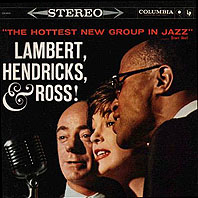
|
Hottest New Group in Jazz... / Lambert, Hendricks & Ross recorded: August 6, 1959 - March 9, 1962 (review) inprint issues: 1959 COLUMBIA CS-8198 ; November 1996, 2 CD´s & CS´s COLUMBIA/LEGACY 64933 (Sony Music Distribution) ; 2001 CD SONY 64933 The CD´s contain 3 LPs that Lambert, Hendricks & Ross made for Columbia records: The Hottest New Group In Jazz, LHR Sing Ellington and High Flying. DAVE LAMBERT, JON HENDRICKS, ANNIE ROSS (voc); HARRY "SWEETS" EDISON (tp); PONY POINDEXTER (as, ss); GILDO MAHONES (p); RON CARTER, IKE ISAACS, WILLIAM YANCY (b); STU MARTIN, WALTER BOLDEN, JIMMY WORMWORTH (dr). TEO MACERO, IRVING TOWNSEND (prod); NEDRA OLDSNEAL (reissue prod); CURTIS BROWN, WILL FRIEDWALD (liner notes) |
| Disc 1 1. Charleston Alley 2. Moanin' 3. Twisted 4. Bijou 5. Cloudburst 6. Centerpiece 7. Gimme That Wine 8. Sermonette 9. Summertime 10. Everybody's Boppin' 11. Cotton Tail 12. All Too Soon 13. Happy Anatomy 14. Rocks In My Bed 15. Main Stem 16. I Don't Know What Kind Of Blues I've Got 17. Things Ain't What They Used To Be 18. Midnight Indigo 19. What Am I Here For? 20. In A Mellow Tone 21. Caravan |
(Henderson/Kirkland) (Hendricks/Timmons) (Gray/Ross) (Burns/Hendricks) (Harris/Kirkland) (Edison/Hendricks) (Hendricks) (Gershwin/Heyward) (Gershwin/Heyward) (Hendricks) (Ellington) (Ellington/Sigman) (Ellington) (Ellington) (Ellington) (Ellington) (Ellington/Mercer/Persons) (Ellington) (Ellington) (Ellington/Gabler) (Ellington/Mills/Tizol) |
Disc 2 1. Come On Home 2. The New ABC 3. Farmer's Market 4. Cookin' At The Continental 5. With Malice Toward None 6. Hi-Fly 7. Home Cookin' 8. Halloween Spooks 9. Popity Pop 10. Blue 11. Mr. P. C. 12. Walkin' [#] 13. This Here [*] 14. Swingin' Till The Girls Come Home [*] 15. Twist City [#] 16. Just A Little Bit Of Twist [#] 17. A Night In Tunisia [*] 18. A Night In Tunisia [+] [*] = bonus track [#] previously unreleased [+] previously unreleased, alternate version |
(Hendricks/Silver) (Lambert) (Farmer/Ross) (Hendricks/Silver) (Hendricks/McIntosh) (Weston) (Hendricks/Silver) (Lambert) (Gaillard) (Mahones) (Coltrane/Hendricks) (Carpenter) (Hendricks/Timmons) (Pettiford) (Gee) (Covay) (Gillespie/Paparelli) (Gillespie/Paparelli) |
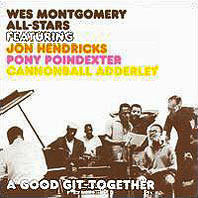
|
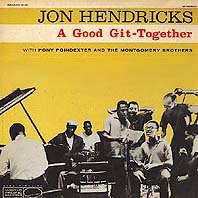
|
A Good Git-Together / Jon Hendricks with Pony Poindexter & The Montgomery Brothers recorded: October 1959 live at Fugazi Hall, San Francisco original issue: 1959 WORLD PACIFIC JAZZ WP-1283 (stereo) #B4 [altered version] on LIBERTY LBS 83178E (with additional brass) The import CD on the left features two rare Wes Montgomery sessions, previously not available on CD. JON HENDRICKS (voc); CANNONBALL ADDERLEY (as, exc. #A2,6, #B2,3); PONY POINDEXTER (as, voc); NAT ADDERLEY (cor, exc. #A2,6, #B2,3); BUDDY MONTGOMERY (vib #A2,6, #B2,3); GILDO MAHONES (p); WES MONTGOMERY (g); MONK MONTGOMERY (el-b); IKE ISSACS (b); JIMMY WORMSWORTH, WALTER BOLDEN (dr); + BLOCKBUSTER (as) & his Brother (cor)
|
| Gildo Mahones did write out some intro passages and some endings, but this was done right on the spot. (Remember, I've been singin' much such "head" arrangements as Buck Clayton's 'Avenue C' with Lambert, Hendricks & Ross, an' I like that idea.) The songs we do on side one are: ‘Everything Started On The House Of Lord’, my philosophy of life which Lambert, Hendricks & Ross expounded in our introductions to the acts on the recent Monterey Jazz Festival, and which Pony leads with all his heart and soul, of which there is great abundance. I call this my modern spiritual. ‘Music In The Air’, music by Gigi Gryce, original tune 'Wilwood' which Stan Getz did for Gigi and in wich I express, lyrically, my philo- sophy of music. 'Feed Me’, which I wrote 8 years ago for Louis Jordan (lyrics & music) and on which I try to get as much of Louis´ inimitable style as I possibly can. ‘I'll Die Happy’, which I also wrote for Louis Jordan and which he recorded (best rhythm'n blues recording of 1956-Cashbox) and which I dearly love. ‘Pretty Strange’ music by the incomparable Randy Weston. Very pretty, very strange, pretty strange. ‘The Shouter’ written by good friend Gildo Mahones, our pianist with the Lambert, Hendricks & Ross group. | This is a spontaneous version (no arrangement) where I chimed in vocally adding the fourth horn part. The songs we do on side two one are: ‘Minor Catastrophe’ an instrumental I wrote just to see if I could and which Pepper Adams recorded with Jimmy Knepper and on which Pony Poindexter scats in a way that gives us ALL music lessons. ‘Social Call’ music by Gigi Gryce, which I have always loved since Ernestine Anderson sang if five years ago, before going to Sweden and which she recently recorded again. ‘Out Of the Pass’ music by Benny Golson, and what more do you want me to say 'bout that? ‘A Good Git-Together’ which I got together at the last minute, because I love everybody on the date and what they had done and celebrated the feeling the only way I know how - by writing a song. ‘I'm Gonna Shout’ a reprise of ‘Everything Started On The House Of Lord’, with Pony leading the World Pacific Church Choir, brother Bill Perkins on tambourine. I did all lyrics, plus music to ‘Minor Catastrophe’, ‘Feed Me’, ‘Everything Started On The House Of Lord’, ‘A Good Git-Together’ and ‘I'll Die Happy’. I enjoyed it immensely and hope you will too. It sure was a good "git-together". | ||
| Review: Of the many projects Hendricks has been involved in, this is his crowning glory. It toured the country as a stage production, depicting the history of African-American roots music, from spirituals and field hollers to blues, gospel, and jazz. Hendricks recites signposts of the musical progression in rhyme, and singing here and there. Pony Poindexter plays a little tenor sax and talks about New Orleans, while Ike Isaacs' trio backs the singers. An intro by Hendricks postulates that adults "have their minds made up, don't confuse 'em with facts and refers to musicians as "metaphysicians”. This is one of several pieces where the chorus hums while Hendricks tells his tale. African drums, serving as a call-and-response device, inform "Amo". A slave story told in a Harry Belafonte style by Hendricks accents ‘Some Stopped On De Way’, while a spiritual rap precedes ‘Swing Low Sweet Chariot’. Big Miller digs into a personalized gospel blues, ‘If I Had My Share’, and Witherspoon belts ‘Please Send Me Someone To Love’ like only he can. A highlight is Miller's ‘Sufferin' Blues’, followed by Hendricks' field holler ‘Aw, Gal’ and Witherspoon's groovin' ‘C.C. (Circuit) Rider’. | 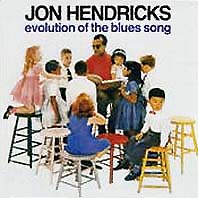
|
Evolution Of The Blues Song / Jon Hendricks recorded: September 21, 1960 live at the Monterey Jazz Festival issues: 1960 LP COLUMBIA 1583 (mono) ; 1961 LP COLUMBIA CS 8383 ; COLUMBIA 51905 DEEP GROOVE (promo copy) ; CD COLUMBIA Special Products 8383 ; 1995 CS COLUMBIA Special Products 75069 JON HENDRICKS; HANNAH DEAN; BIG MILLER; PONY POINDEXTER, BEN WEBSTER (ts); JIMMY WITHERSPOON (voc) & THE IKE ISAACS TRIO; ERIC GALE, GILDO MAHONES (p); BOBBY GIBBONS (g); JIMMY WORMWORTH, IKE ISAACS (dr) 1. Introduction / Jon Hendricks 2. Amo / Jon Hendricks & Chorus 3. Some Stopped On De Way / Jon Hendricks 4. Swing Low, Sweet Chariot / Hannah Dean 5. New Orleans / Pony Poindexter 6. I Had My Share / 'Big' Miller 7. Please Send Me Someone To Love / Jimmy Witherspoon 8. Sufferin´ Blues / 'Big' Miller 9. That's Enough / Hannah Dean 10. Aw Gal / Jon Hendricks 11. See See Rider / Jimmy Witherspoon 12. Jumpin´ With Symphony Sid / Pony Poindexter 13. Sun Gonna Shine In My Door / Jimmy Witherspoon 14. W.P.A. Blues / Jon Hendricks 15. Sometimes I Feel Like A Motherless Child / 'Big' Miller |
|
| Reviews: The history of jazz is full of talented singers who, for whatever reason, never became as well-known as they should have been. That is certainly true of Bev Kelly, an obscure Bay Area-based vocalist whose influences ranged from Anita O'Day to Billie Holiday and Dinah Washington. It's safe to say that the vast majority of jazz lovers have never even heard of Kelly, but the singer did have an enthusiastic supporter in Orrin Keepnews, who produced this live date for Riverside. Recorded at the Coffee Gallery in San Francisco in 1960, In Person was out of print for a long time but finally became available on CD when Fantasy reissued it for Original Jazz Classics in 1999. Kelly had a raspy yet sweetly vulnerable delivery and that approach serves her well on tasteful, introspective performances of well-known standards like ‘My Funny Valentine’, ‘Long Ago And Far Away’, and ‘Body And Soul’. Kelly swings, but she does so in a subtle fashion. Thankfully, the singer has sympathetic accompaniment in alto saxman Pony Poindexter, pianist Flip Nunez, bassist Johnny Allen, and drummer Tony | 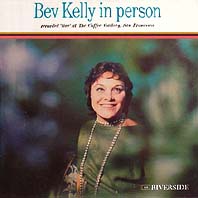
|
Bev Kelly In Person / Beverly Kelly recorded: October 14, 1960 at the Coffee Gallery, San Francisco issues: MILESTONE/RIVERSIDE SMJ 6042 ; 1960 RIVERSIDE RS-9345, RLP-345 (mono) ; March 9, 1999 CD ORIGINAL JAZZ CLASSICS 1019(-2) ; 1999 remastered CD FANTASY JAZZ (only USA) BEVERLY KELLY (voc); PONY POINDEXTER (as); FLIP NUNEZ (p); JOHNNY ALLEN (b); TONY JOHNSON (dr); ORRIN KEEPNEWS (prod); JIM MARSHALL, WILLIAM CLAXTON (photos)
|
Live recording in San Francisco nightclubs during 1959 and '60 yielded such marvelous results for Riverside Records as The Cannonball Adderley Quintet in San Francisco (OJC- 035), cut at the Jazz Workshop, and Thelonious Monk Quartet Plus Two at the Blackhawk (OJC-305). The names of singer Bev Kelly and the Coffee Gallery are hardly as illustrious, yet Kelly's belief in the results that would follow from documenting her sets at this obscure Bay Area room produced an album of lasting value. Interpreting standards at a range of tempos, Kelly displays roots in Anita O'Day's style together with a more intimate delivery. She receives responsive support from alto saxophonist Pony Poindexter and pianist Flip Nunez, two musicians who (like Kelly) deserved far wider recognition. -- Right down to the final glottal ululation, so closely does this acolyte suggest her sonic role model, Anita O'Day, that Bev Kelly In Person might as well have been reissued as "Anita- mania: Not the Real Thing But an Incredible Simulation." And unlike Moody Marilyn Moore, who had her brief moment in 1957 with a not-very-good attempt to evoke Lady Day, one gets the feeling that Kelly just might sound this way roused out of a deep sleep. The resemblance in timbre to O'Day is even apparent during her between-song patter on this affair, recorded live at the Coffee Gallery in San Francisco on October 14, 1960. The only noticeable differences between the two vocalists are that Kelly has a slightly higher voice; and that O'Day plays with the beat via techniques of vowel extension and scat, while Kelly tends to add, subtract and displace words. And another thing: After venturing off on some Handelian roulade of atonal overkill, O'Day usually lands back on her feet, while Kelly oftentimes stumbles badly. On Just Friends, for example, Kelly has the inane taste to fill up a missing beat by interpolating ain't lovers no more. Gak! And her It Never Entered My Mind can't help but evoke Dorothy Loudon's wounding send-up of the "take no prisoners" school of jazz-singing included on her unforgivably out-of-print 'At the Blue Note'.The 50s were an era of unbridled warfare between the mannered chicks versus the straight-ahead swingers, with reviewers and fans solidly lined up on opposite sides of the Jesuitical question of singers who "took liberties" with composers' and lyricists' intentions. Richard Rodgers was so rigid regarding singers adhering to the song-as written, it's rumored he even dis- liked some of Sinatra's interpretations of his works. He also originally balked at Peggy Lee's mildly radical 1952 reworking of his 'Little |
Waltz, Lover'. The jazz-friendly composer Alec Wilder also had problems with singers who threw the melody up into the air. If, like Rodgers and Wilder, you crave a songbird who adheres to the printed staff, then the hipper-than-thou Kelly is definitely not your cup of musical tea. In a giddy kind of way, I like Bev Kelly.You know how it is sometimes, you want to go out for Thai food but end up getting Chinese because that restaurant is close-by. Similarly, if you're in an O'Day mood but you're temporarily burned out on her, perhaps Bev Kelly In Person might be just the album for which you've been searching. Then again … Chicago, the proving grounds for the likes of O'Day, Carmen McRae, Sarah Vaughan, Audrey Mor- ris, Lurlean Hunter, Lucy Reed, and many others, was, throughout the 1940s and 1950s, the Cradle of Modern Jazz Singing. Kelly is of this "school." After studying piano and voice at the Cincinnati Conservatory of Music, she became a mainstay - first with the Pat Moran Quartet and then solo - of such fabled Second City locales as Mr. Kelly's and the Cloister Inn. The last we heard of her, in the mid-1980s, she was tuned into the music of the sphe- res, working southern California in a style that made her 1960 self sound positively tame by comparison. Inside most of the numbers here, there's a well thoughout, logical reinterpretation just dying to get out. But as my mother used to complain about comedian Sid Caesar (unfairly, I think), Kelly "just doesn't know when to quit." Not for the faint of heart is this album as she careens her way through a Great American Songbook (GAS) repertoire that also includes Night and Day, Falling in Love with Love, This Is Always, and My Funny Valentine. Of Betty Carter, the New Yorker's Whitney Balliett wrote perhaps the ultimate defense of GAS deconstruction: "At first hearing, her choice of notes seems quirky. But the original melodic shape she draws out of her songs demands 'wrong' notes, and she chooses them with daring and intelligence." Kelly finds hers with a toss of the dice. Sometimes seven comes up, most times not. And that's the way it goes throughout the 39:27 running time of this reissue of the second of Kelly's two Riverside albums. Kelly's Love Locked Out (1960) has also been put back in print to thrill and amaze you with her vowels, long enough to inspire new diacritical marks, intonation from somewhere south of down- town India, and attitudinizing that brings new meaning to the word "presh." Lovers of the caution-to-the-wind school of singing will be amused, while GAS purists will be left slack-jawed and aghast. |
||
| biography I discography 1 2 3 4 |
|
|